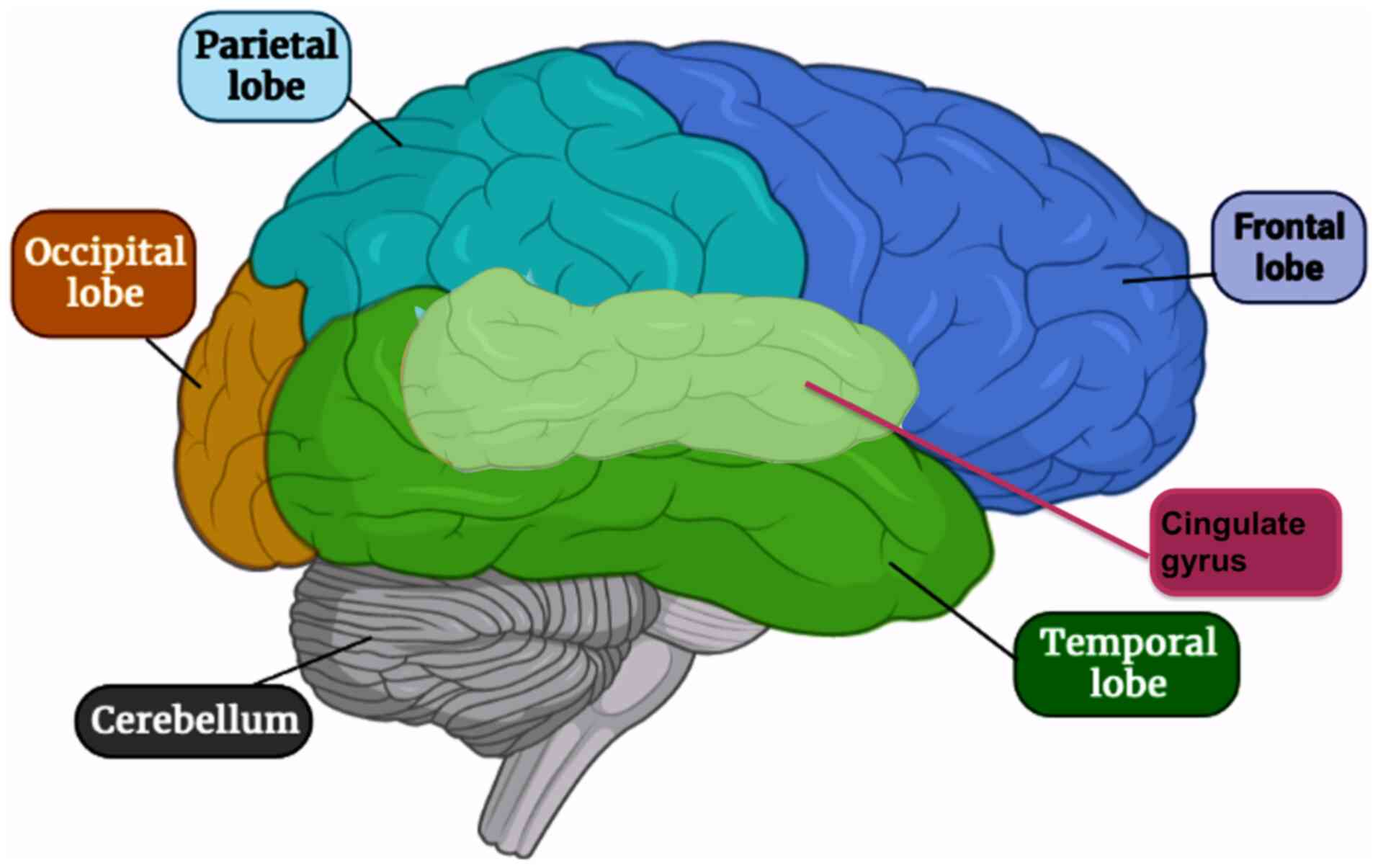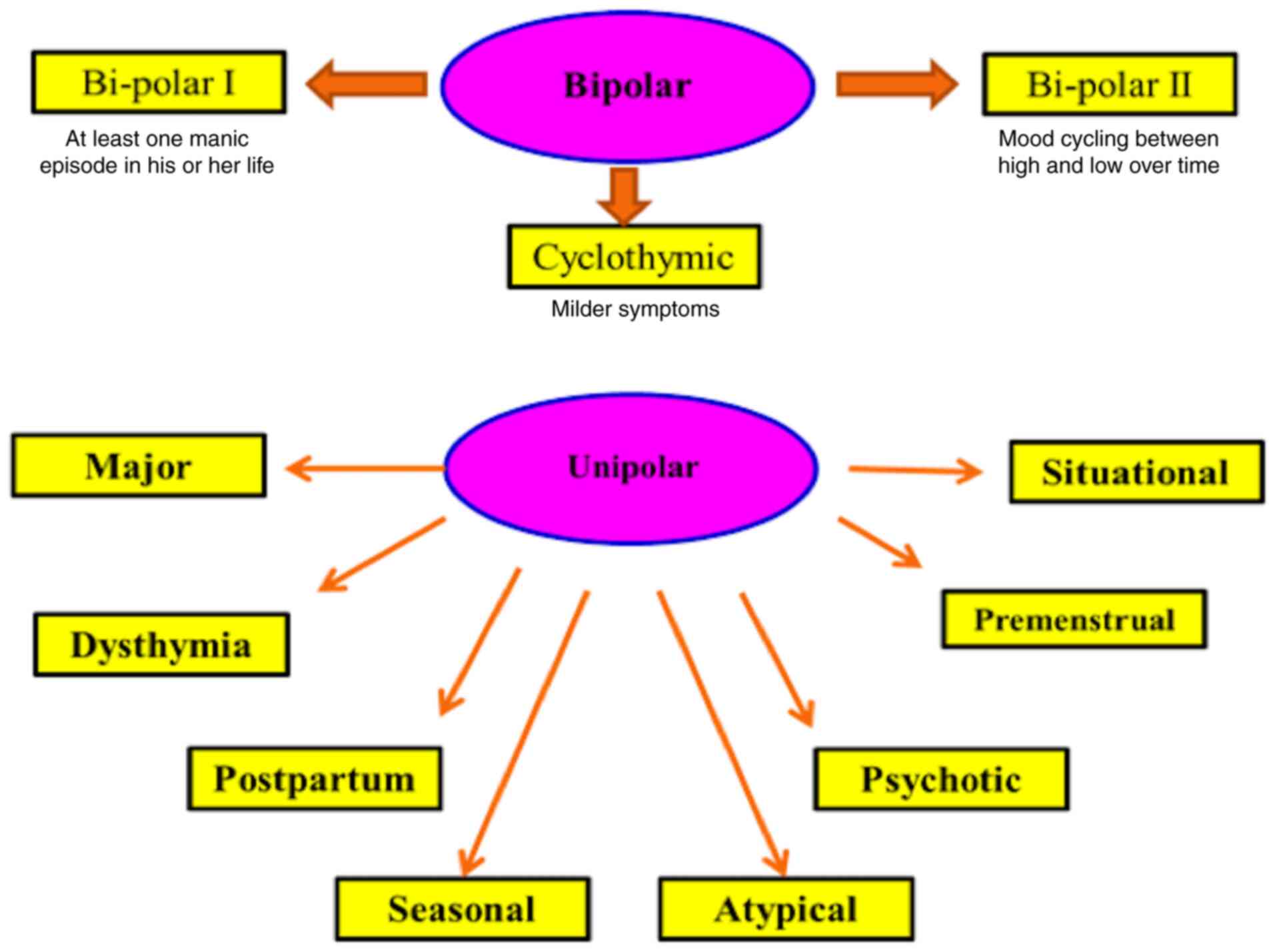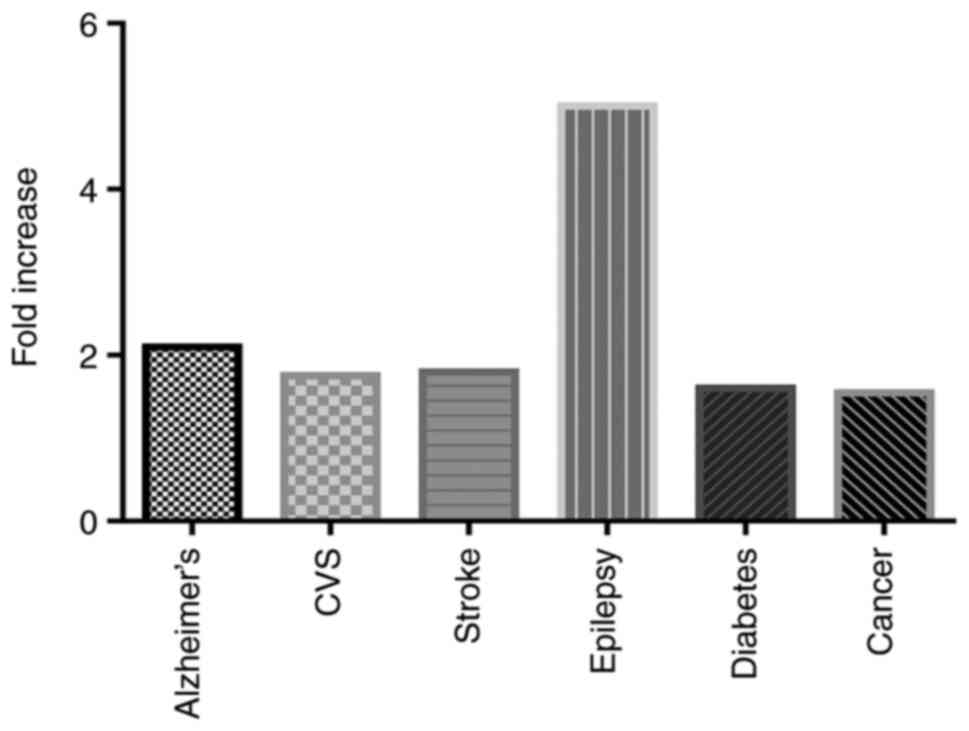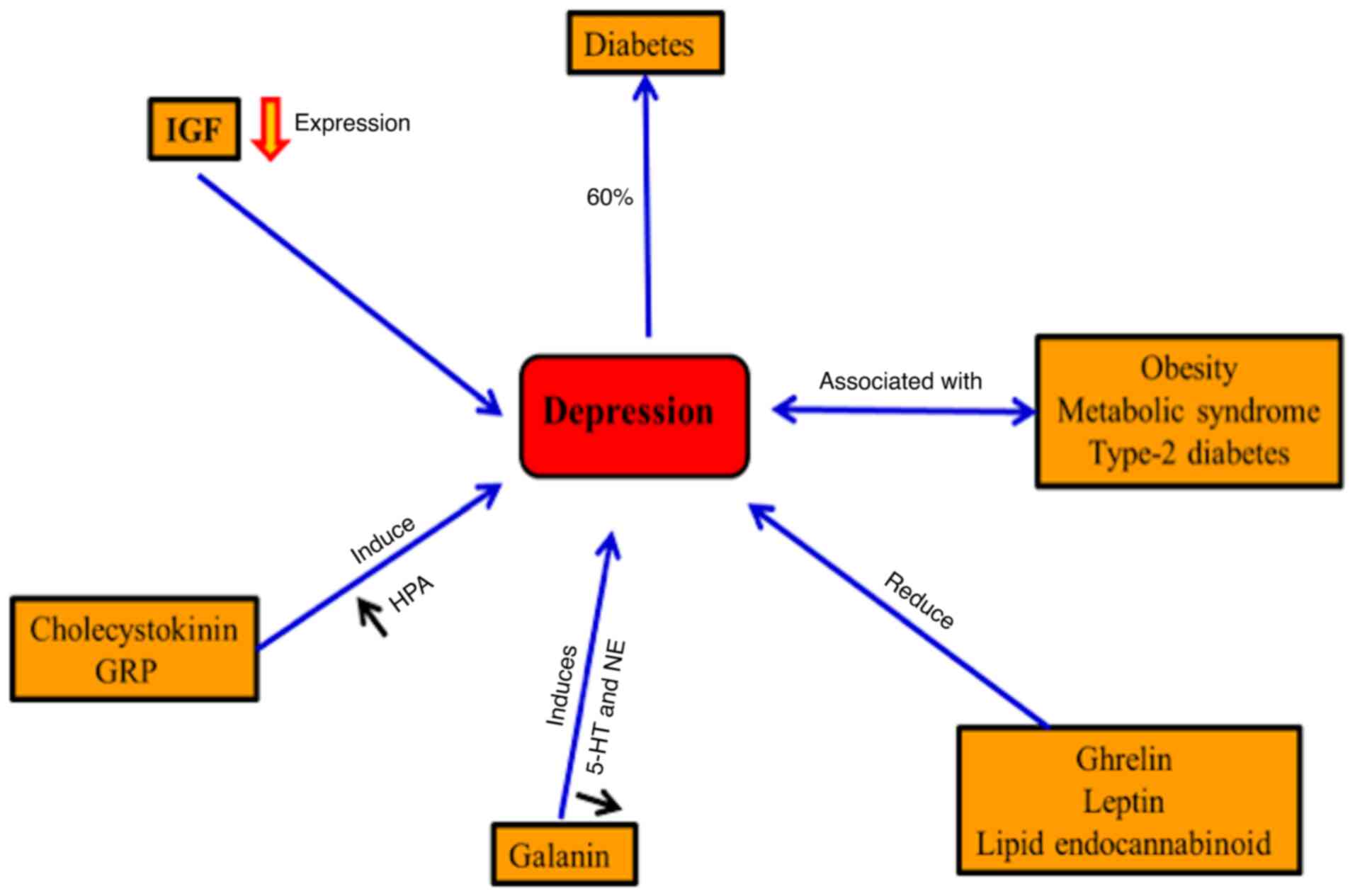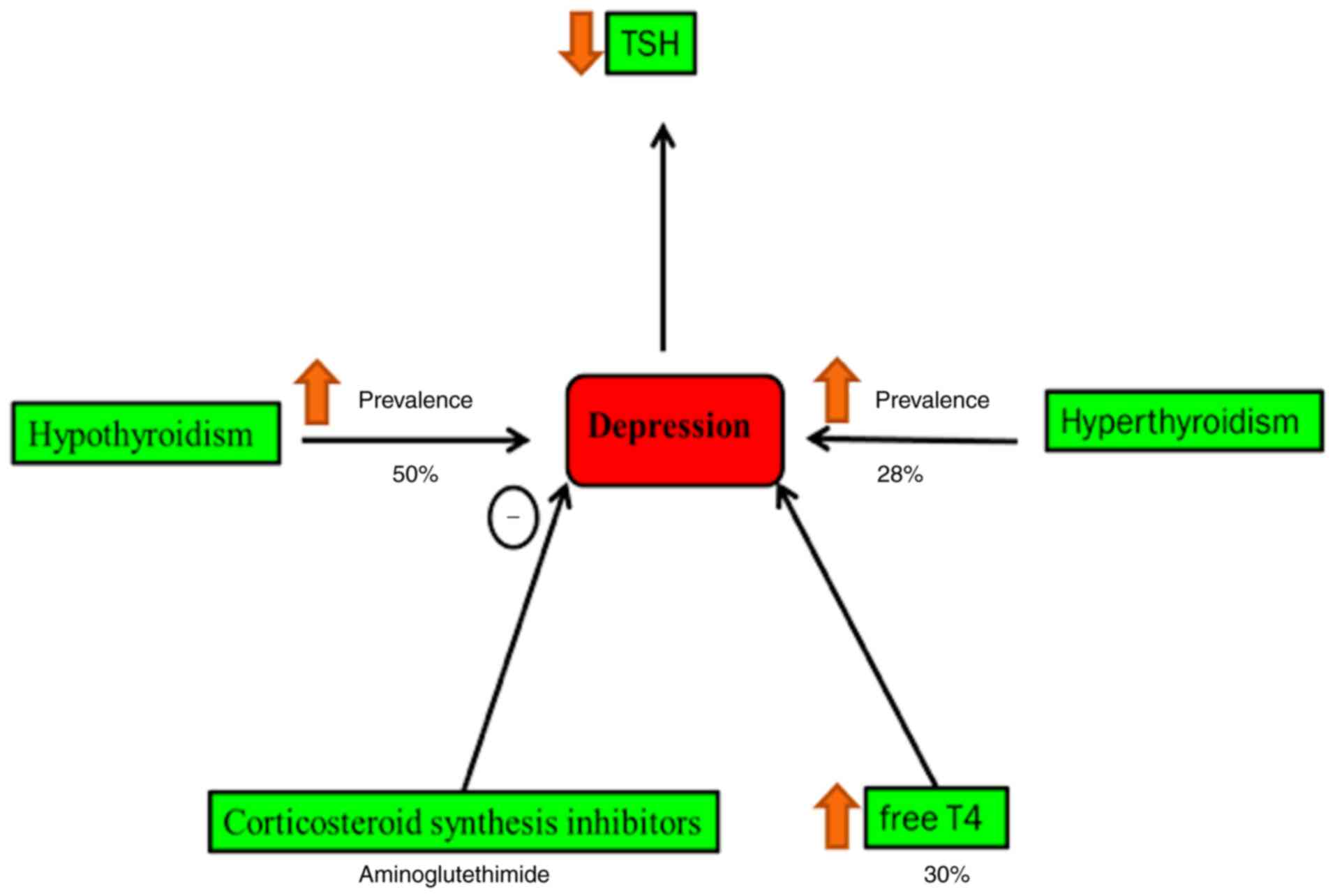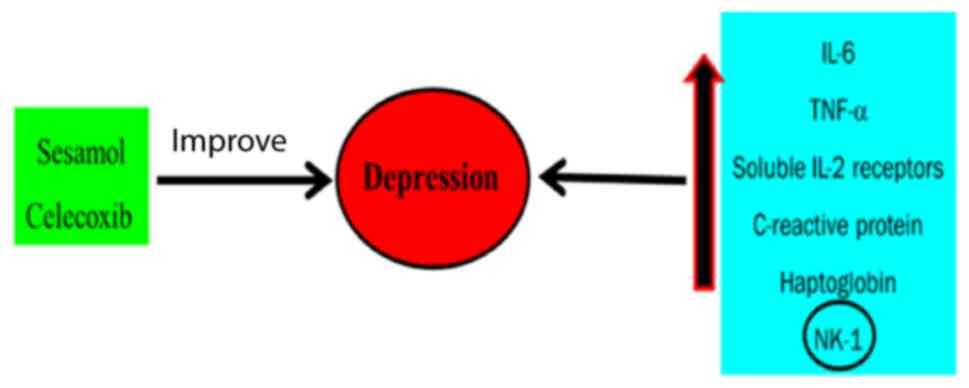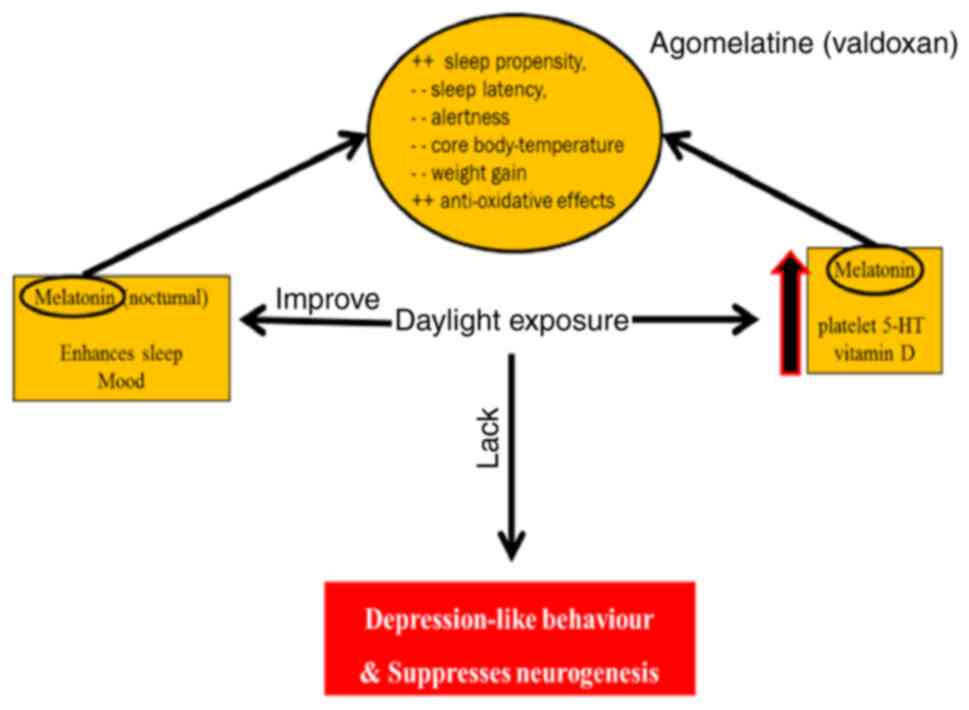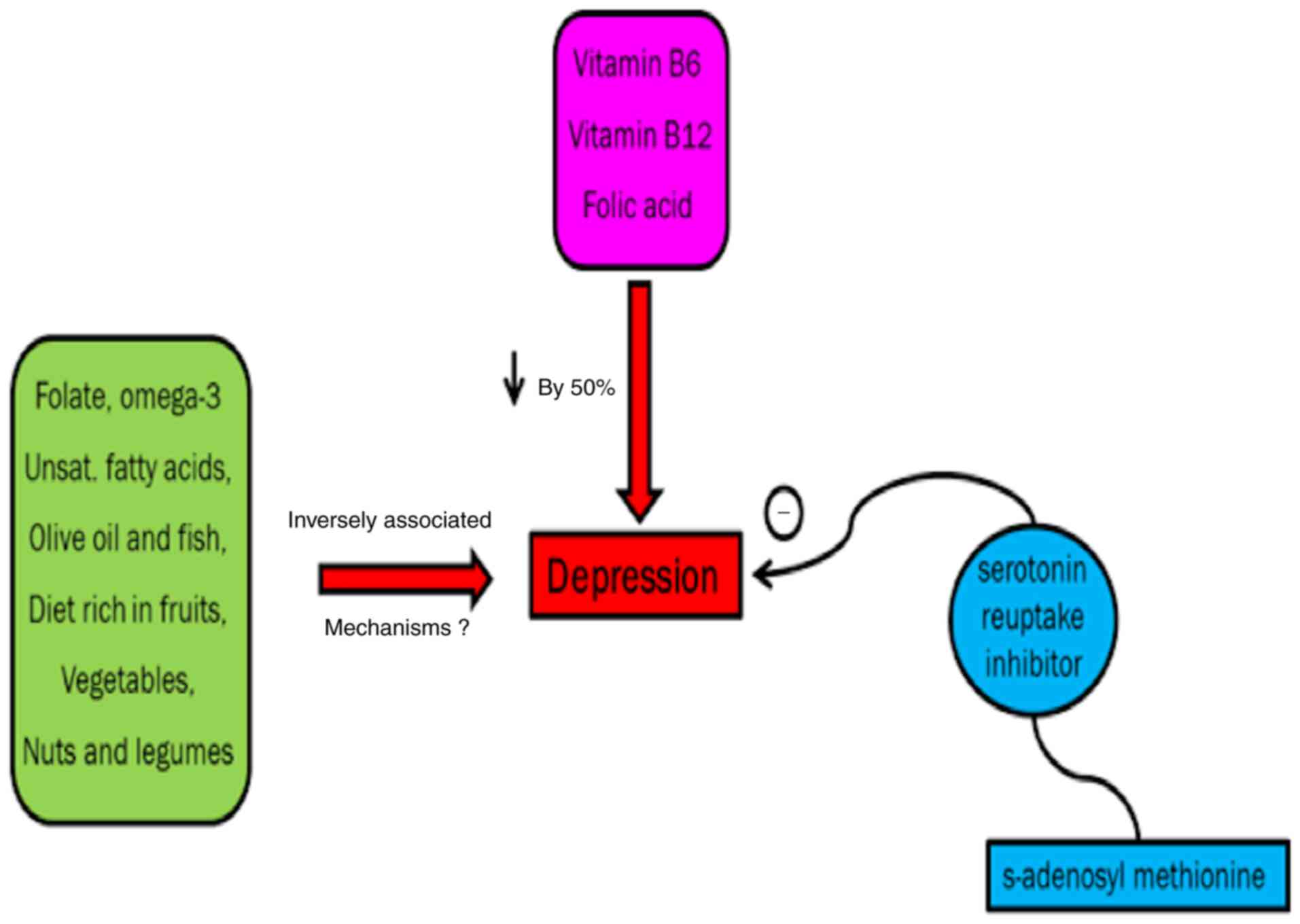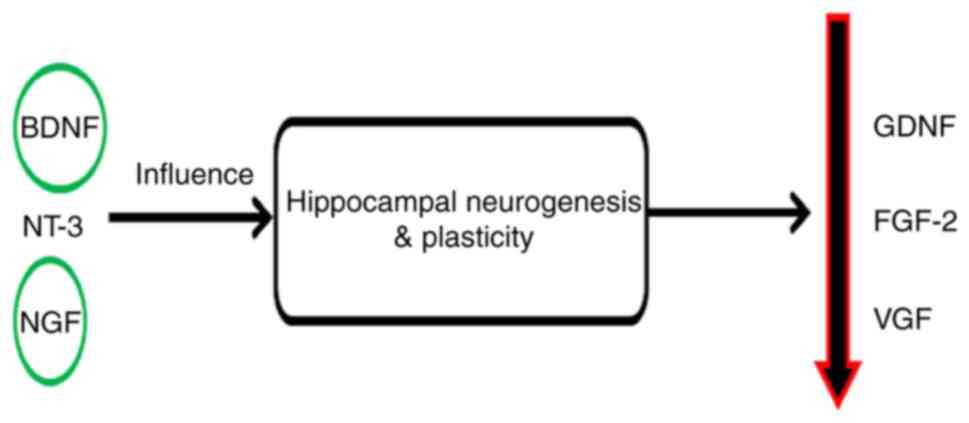|
1
|
Averina OV, Zorkina YA, Yunes RA, Kovtun
AS, Ushakova VM, Morozova AY, Kostyuk GP, Danilenko VN and
Chekhonin VP: Bacterial metabolites of human gut microbiota
correlating with depression. Int J Mol Sci. 21:92342020. View Article : Google Scholar : PubMed/NCBI
|
|
2
|
Delgado PL and Moreno FA: Role of
norepinephrine in depression. J Clin Psychiatry. 61 (Suppl
1):S5–S12. 2000.PubMed/NCBI
|
|
3
|
Zhang FF, Peng W, Sweeney JA, Jia ZY and
Gong QY: Brain structure alterations in depression:
Psychoradiological evidence. CNS Neurosci Ther. 24:994–1003. 2018.
View Article : Google Scholar : PubMed/NCBI
|
|
4
|
Fox ME and Lobo MK: The molecular and
cellular mechanisms of depression: A focus on reward circuitry. Mol
Psychiatry. 24:1798–1815. 2019. View Article : Google Scholar : PubMed/NCBI
|
|
5
|
Muller JK and Leweke FM: Bipolar disorder:
Clinical overview. Med Monatsschr Pharm. 39:363–369.
2016.PubMed/NCBI
|
|
6
|
American Psychiatric Association A and
Association AP, . Diagnostic and Statistical Manual of Mental
Dsorders (DSM-5). American Psychiatric Association; Washington, DC:
2013
|
|
7
|
Assari S: Chronic medical conditions and
major depressive disorder: Differential role of positive religious
coping among African Americans, Caribbean blacks and non-hispanic
whites. Int J Prev Med. 5:405–413. 2014.PubMed/NCBI
|
|
8
|
Devanand DP: Dysthymic disorder in the
elderly population. Int Psychogeriatr. 26:39–48. 2014. View Article : Google Scholar : PubMed/NCBI
|
|
9
|
Molyneaux E, Poston L, Ashurst-Williams S
and Howard LM: Obesity and mental disorders during pregnancy and
postpartum: A systematic review and meta-analysis. Obstet Gynecol.
123:857–867. 2014. View Article : Google Scholar : PubMed/NCBI
|
|
10
|
Sanassi LA: Seasonal affective disorder:
Is there light at the end of the tunnel? JAAPA. 27:18–23. 2014.
View Article : Google Scholar : PubMed/NCBI
|
|
11
|
Gremaud-Heitz D, Riemenschneider A, Walter
M, Sollberger D, Kuchenhoff J and Dammann G: Comorbid atypical
depression in borderline personality disorder is common and
correlated with anxiety-related psychopathology. Compr Psychiatry.
55:650–656. 2014. View Article : Google Scholar : PubMed/NCBI
|
|
12
|
Østergaard SD, Meyers BS, Flint AJ,
Mulsant BH, Whyte EM, Ulbricht CM, Bech P and Rothschild AJ;
STOP-PD Study Group, : Measuring psychotic depression. Acta
Psychiatr Scand. 129:211–220. 2014. View Article : Google Scholar : PubMed/NCBI
|
|
13
|
Muralidharan K, Torres IJ, Silveira LE,
Kozicky JM, Bücker J, Fernando N and Yatham LN: Impact of
depressive episodes on cognitive deficits in early bipolar
disorder: Data from the systematic treatment optimization programme
for early mania (STOP-EM). Br J Psychiatry. 205:36–43. 2014.
View Article : Google Scholar : PubMed/NCBI
|
|
14
|
Benti L, Manicavasagar V, Proudfoot J and
Parker G: Identifying early indicators in bipolar disorder: A
qualitative study. Psychiatr Q. 85:143–153. 2014. View Article : Google Scholar : PubMed/NCBI
|
|
15
|
Harnic D, Pompili M, Innamorati M, Erbuto
D, Lamis DA, Bria P, Girardi P and Janiri L: Affective temperament
and attachment in adulthood in patients with bipolar disorder and
cyclothymia. Compr Psychiatry. 55:999–1006. 2014. View Article : Google Scholar : PubMed/NCBI
|
|
16
|
Craner JR, Sigmon ST, Martinson AA and
McGillicuddy ML: Premenstrual disorders and rumination. J Clin
Psychol. 70:32–47. 2014. View Article : Google Scholar : PubMed/NCBI
|
|
17
|
Simpson T and Ivey J: Pediatric management
problems. Situational depression. Pediatr Nurs. 31:312–313.
2005.PubMed/NCBI
|
|
18
|
Jorm AF, Christensen H, Griffiths KM and
Rodgers B: Effectiveness of complementary and self-help treatments
for depression. Med J Aust. 176:S84–S96. 2002. View Article : Google Scholar : PubMed/NCBI
|
|
19
|
Baldwin DS: Unmet needs in the
pharmacological management of depression. Hum Psychopharmacol.
16:S93–S99. 2001. View Article : Google Scholar : PubMed/NCBI
|
|
20
|
Hossain MM, Tasnim S, Sultana A, Faizah F,
Mazumder H, Zou L, McKyer ELJ, Ahmed HU and Ma P: Epidemiology of
mental health problems in COVID-19: A review. F1000Res. 9:6362020.
View Article : Google Scholar : PubMed/NCBI
|
|
21
|
Pedersen CB, Mors O, Bertelsen A, Waltoft
BL, Agerbo E, McGrath JJ, Mortensen PB and Eaton WW: A
comprehensive nationwide study of the incidence rate and lifetime
risk for treated mental disorders. JAMA Psychiatry. 71:573–581.
2014. View Article : Google Scholar : PubMed/NCBI
|
|
22
|
Mojtabai R, Olfson M and Han B: National
trends in the prevalence and treatment of depression in adolescents
and young adults. Pediatrics. 138:e201618782016. View Article : Google Scholar : PubMed/NCBI
|
|
23
|
Substance Abuse and Mental Health Services
Association, . 2018.
|
|
24
|
Duffy ME, Twenge JM and Joiner TE: Trends
in mood and anxiety symptoms and suicide-related outcomes among
U.S. undergraduates, 2007–2018: Evidence from two national surveys.
J Adolesc Health. 65:590–598. 2019. View Article : Google Scholar : PubMed/NCBI
|
|
25
|
Kuehner C: Why is depression more common
among women than among men? Lancet Psychiatry. 4:146–158. 2017.
View Article : Google Scholar : PubMed/NCBI
|
|
26
|
Wang PS, Aguilar-Gaxiola S, Alonso J,
Angermeyer MC, Borges G, Bromet EJ, Bruffaerts R, de Girolamo G, de
Graaf R, Gureje O, et al: Use of mental health services for
anxiety, mood, and substance disorders in 17 countries in the WHO
world mental health surveys. Lancet. 370:841–850. 2007. View Article : Google Scholar : PubMed/NCBI
|
|
27
|
Katon W and Sullivan MD: Depression and
chronic medical illness. J Clin Psychiatry. 51 (Suppl):S3–S14.
1990.PubMed/NCBI
|
|
28
|
Lebowitz BD, Pearson JL, Schneider LS,
Reynolds CF III, Alexopoulos GS, Bruce ML, Conwell Y, Katz IR,
Meyers BS, Morrison MF, et al: Diagnosis and treatment of
depression in late life. Consensus statement update. JAMA.
278:1186–1190. 1997. View Article : Google Scholar : PubMed/NCBI
|
|
29
|
Slavich GM and Irwin MR: From stress to
inflammation and major depressive disorder: A social signal
transduction theory of depression. Psychol Bull. 140:774–815. 2014.
View Article : Google Scholar : PubMed/NCBI
|
|
30
|
Green RC, Cupples LA, Kurz A, Auerbach S,
Go R, Sadovnick D, Duara R, Kukull WA, Chui H, Edeki T, et al:
Depression as a risk factor for Alzheimer disease: The MIRAGE
study. Arch Neurol. 60:753–759. 2003. View Article : Google Scholar : PubMed/NCBI
|
|
31
|
Ramasubbu R and Patten SB: Effect of
depression on stroke morbidity and mortality. Can J Psychiatry.
48:250–257. 2003. View Article : Google Scholar : PubMed/NCBI
|
|
32
|
Hesdorffer DC, Hauser WA, Annegers JF and
Cascino G: Major depression is a risk factor for seizures in older
adults. Ann Neurol. 47:246–249. 2000. View Article : Google Scholar : PubMed/NCBI
|
|
33
|
Nouwen A, Lloyd CE and Pouwer F:
Depression and type 2 diabetes over the lifespan: A meta-analysis.
Response to Mezuk et al. Diabetes Care. 32:e56–e57. 2009.
View Article : Google Scholar : PubMed/NCBI
|
|
34
|
Penninx BW, Guralnik JM, Pahor M, Ferrucci
L, Cerhan JR, Wallace RB and Havlik RJ: Chronically depressed mood
and cancer risk in older persons. J Natl Cancer Inst. 90:1888–1893.
1998. View Article : Google Scholar : PubMed/NCBI
|
|
35
|
Keller MB, Hirschfeld RM, Demyttenaere K
and Baldwin DS: Optimizing outcomes in depression: Focus on
antidepressant compliance. Int Clin Psychopharmacol. 17:265–271.
2002. View Article : Google Scholar : PubMed/NCBI
|
|
36
|
Bouwman V, Adriaanse MC, van't Riet E,
Snoek FJ, Dekker JM and Nijpels G: Depression, anxiety and glucose
metabolism in the general dutch population: The New Hoorn Study.
PLoS One. 5:e99712010. View Article : Google Scholar : PubMed/NCBI
|
|
37
|
Shelton RC and Miller AH: Eating ourselves
to death (and despair): The contribution of adiposity and
inflammation to depression. Prog Neurobiol. 91:275–299. 2010.
View Article : Google Scholar : PubMed/NCBI
|
|
38
|
Shirey K, Manyara SM, Atwoli L, Tomlin R,
Gakinya B, Cheng S, Kamano J, Laktabai J and Pastakia S: Symptoms
of depression among patients attending a diabetes care clinic in
rural western Kenya. J Clin Transl Endocrinol. 2:51–54.
2015.PubMed/NCBI
|
|
39
|
Häfner S, Baumert J, Emeny RT, Lacruz ME,
Thorand B, Herder C, Koenig W, Rupprecht R and Ladwig KH: Sleep
disturbances and depressed mood: A harmful combination associated
with increased leptin levels in women with normal weight. Biol
Psychol. 89:163–169. 2012. View Article : Google Scholar : PubMed/NCBI
|
|
40
|
Becker C, Zeau B, Rivat C, Blugeot A,
Hamon M and Benoliel JJ: Repeated social defeat-induced
depression-like behavioral and biological alterations in rats:
Involvement of cholecystokinin. Mol Psychiatry. 13:1079–1092. 2008.
View Article : Google Scholar : PubMed/NCBI
|
|
41
|
Kozlovsky N, Matar MA, Kaplan Z, Zohar J
and Cohen H: The role of the galaninergic system in modulating
stress-related responses in an animal model of posttraumatic stress
disorder. Biol Psychiatry. 65:383–391. 2009. View Article : Google Scholar : PubMed/NCBI
|
|
42
|
Cline BH, Steinbusch HW, Malin D,
Revishchin AV, Pavlova GV, Cespuglio R and Strekalova T: The
neuronal insulin sensitizer dicholine succinate reduces
stress-induced depressive traits and memory deficit: Possible role
of insulin-like growth factor 2. BMC Neurosci. 13:1102012.
View Article : Google Scholar : PubMed/NCBI
|
|
43
|
Roesler R, Henriques JA and Schwartsmann
G: Gastrin-releasing peptide receptor as a molecular target for
psychiatric and neurological disorders. CNS Neurol Disord Drug
Targets. 5:197–204. 2006. View Article : Google Scholar : PubMed/NCBI
|
|
44
|
Musselman DL and Nemeroff CB: Depression
and endocrine disorders: Focus on the thyroid and adrenal system.
Br J Psychiatry Suppl. 123–128. 1996. View Article : Google Scholar : PubMed/NCBI
|
|
45
|
Frey A, Lampert A, Dietz K, Striebich S,
Locher C, Fedorenko O, Möhle R, Gallinat J, Lang F and Lang UE:
Thyrotropin serum concentrations in healthy volunteers are
associated with depression-related personality traits.
Neuropsychobiology. 56:123–126. 2007. View Article : Google Scholar : PubMed/NCBI
|
|
46
|
Bahls SC and de Carvalho GA: The relation
between thyroid function and depression: A review. Braz J
Psychiatry. 26:41–49. 2004.(In Portuguese). View Article : Google Scholar : PubMed/NCBI
|
|
47
|
Cleare AJ, McGregor A and O'Keane V:
Neuroendocrine evidence for an association between hypothyroidism,
reduced central 5-HT activity and depression. Clin Endocrinol
(Oxf). 43:713–719. 1995. View Article : Google Scholar : PubMed/NCBI
|
|
48
|
Holtzheimer PE III and Nemeroff CB: Future
prospects in depression research. Dialogues Clin Neurosci.
8:175–189. 2006. View Article : Google Scholar : PubMed/NCBI
|
|
49
|
Banki CM, Bissette G, Arato M, O'Connor L
and Nemeroff CB: CSF corticotropin-releasing factor-like
immunoreactivity in depression and schizophrenia. Am J Psychiatry.
144:873–877. 1987. View Article : Google Scholar : PubMed/NCBI
|
|
50
|
Lippi G, Montagnana M, Favaloro EJ and
Franchini M: Mental depression and cardiovascular disease: A
multifaceted, bidirectional association. Semin Thromb Hemost.
35:325–336. 2009. View Article : Google Scholar : PubMed/NCBI
|
|
51
|
Tiemeier H, van Dijck W, Hofman A,
Witteman JC, Stijnen T and Breteler MM: Relationship between
atherosclerosis and late-life depression: The rotterdam study. Arch
Gen Psychiatry. 61:369–376. 2004. View Article : Google Scholar : PubMed/NCBI
|
|
52
|
Nemeroff CB and Goldschmidt-Clermont PJ:
Heartache and heartbreak-the link between depression and
cardiovascular disease. Nat Rev Cardiol. 9:526–539. 2012.
View Article : Google Scholar : PubMed/NCBI
|
|
53
|
Geiser F, Meier C, Wegener I, Imbierowicz
K, Conrad R, Liedtke R, Oldenburg J and Harbrecht U: Association
between anxiety and factors of coagulation and fibrinolysis.
Psychother Psychosom. 77:377–383. 2008. View Article : Google Scholar : PubMed/NCBI
|
|
54
|
Nemeroff CB and Musselman DL: Are
platelets the link between depression and ischemic heart disease?
Am Heart J. 140 (Suppl 4):S57–S62. 2000. View Article : Google Scholar : PubMed/NCBI
|
|
55
|
Stafford L and Berk M: The use of statins
after a cardiac intervention is associated with reduced risk of
subsequent depression: Proof of concept for the inflammatory and
oxidative hypotheses of depression? J Clin Psychiatry.
72:1229–1235. 2011. View Article : Google Scholar : PubMed/NCBI
|
|
56
|
Jin K, Zhu Y, Sun Y, Mao XO, Xie L and
Greenberg DA: Vascular endothelial growth factor (VEGF) stimulates
neurogenesis in vitro and in vivo. Proc Natl Acad Sci USA.
99:11946–11950. 2002. View Article : Google Scholar : PubMed/NCBI
|
|
57
|
Warner-Schmidt JL and Duman RS: VEGF is an
essential mediator of the neurogenic and behavioral actions of
antidepressants. Proc Natl Acad Sci USA. 104:4647–4652. 2007.
View Article : Google Scholar : PubMed/NCBI
|
|
58
|
Kahl KG, Bens S, Ziegler K, Rudolf S,
Kordon A, Dibbelt L and Schweiger U: Angiogenic factors in patients
with current major depressive disorder comorbid with borderline
personality disorder. Psychoneuroendocrinology. 34:353–357. 2009.
View Article : Google Scholar : PubMed/NCBI
|
|
59
|
Nakataki M, Iga J, Numata S, Yoshimoto E,
Kodera K, Watanabe SY, Song H, Ueno S and Ohmori T: Gene expression
and association analysis of the epithelial membrane protein 1 gene
in major depressive disorder in the Japanese population. Neurosci
Lett. 489:126–130. 2011. View Article : Google Scholar : PubMed/NCBI
|
|
60
|
Dantzer R: Cytokine, sickness behavior,
and depression. Immunol Allergy Clin North Am. 29:247–264. 2009.
View Article : Google Scholar : PubMed/NCBI
|
|
61
|
Akhondzadeh S, Jafari S, Raisi F, Nasehi
AA, Ghoreishi A, Salehi B, Mohebbi-Rasa S, Raznahan M and
Kamalipour A: Clinical trial of adjunctive celecoxib treatment in
patients with major depression: A double blind and placebo
controlled trial. Depress Anxiety. 26:607–611. 2009. View Article : Google Scholar : PubMed/NCBI
|
|
62
|
Müller N, Schwarz MJ, Dehning S, Douhe A,
Cerovecki A, Goldstein-Müller B, Spellmann I, Hetzel G, Maino K,
Kleindienst N, et al: The cyclooxygenase-2 inhibitor celecoxib has
therapeutic effects in major depression: Results of a double-blind,
randomized, placebo controlled, add-on pilot study to reboxetine.
Mol Psychiatry. 11:680–684. 2006. View Article : Google Scholar : PubMed/NCBI
|
|
63
|
Nery FG, Monkul ES, Hatch JP, Fonseca M,
Zunta-Soares GB, Frey BN, Bowden CL and Soares JC: Celecoxib as an
adjunct in the treatment of depressive or mixed episodes of bipolar
disorder: A double-blind, randomized, placebo-controlled study. Hum
Psychopharmacol. 23:87–94. 2008. View Article : Google Scholar : PubMed/NCBI
|
|
64
|
Kumar B, Kuhad A and Chopra K:
Neuropsychopharmacological effect of sesamol in unpredictable
chronic mild stress model of depression: Behavioral and biochemical
evidences. Psychopharmacology (Berl). 214:819–828. 2011. View Article : Google Scholar : PubMed/NCBI
|
|
65
|
Lau BW, Ren C, Yang J, Yan SW, Chang RC,
Pu M and So KF: Light deprivation induces depression-like behavior
and suppresses neurogenesis in diurnal mongolian gerbil (Meriones
unguiculatus). Cell Transplant. 20:871–881. 2011. View Article : Google Scholar : PubMed/NCBI
|
|
66
|
Ljubicić D, Stipcević T, Pivac N,
Jakovljević M and Mück-Seler D: The influence of daylight exposure
on platelet 5-HT levels in patients with major depression and
schizophrenia. J Photochem Photobiol B. 89:63–69. 2007. View Article : Google Scholar : PubMed/NCBI
|
|
67
|
Ubbenhorst A, Striebich S, Lang F and Lang
UE: Exploring the relationship between vitamin D and basic
personality traits. Psychopharmacology (Berl). 215:733–737. 2011.
View Article : Google Scholar : PubMed/NCBI
|
|
68
|
LeBourgeois MK, Carskadon MA, Akacem LD,
Simpkin CT, Wright KP Jr, Achermann P and Jenni OG: Circadian phase
and its relationship to nighttime sleep in toddlers. J Biol
Rhythms. 28:322–331. 2013. View Article : Google Scholar : PubMed/NCBI
|
|
69
|
Almeida OP, Marsh K, Alfonso H, Flicker L,
Davis TM and Hankey GJ: B-vitamins reduce the long-term risk of
depression after stroke: The VITATOPS-DEP trial. Ann Neurol.
68:503–510. 2010. View Article : Google Scholar : PubMed/NCBI
|
|
70
|
Sanhueza C, Ryan L and Foxcroft DR: Diet
and the risk of unipolar depression in adults: Systematic review of
cohort studies. J Hum Nutr Diet. 26:56–70. 2013. View Article : Google Scholar : PubMed/NCBI
|
|
71
|
Lazarou C and Kouta C: The role of nurses
in the prevention and management of obesity. Br J Nurs. 19:641–647.
2010. View Article : Google Scholar : PubMed/NCBI
|
|
72
|
Papakostas GI, Mischoulon D, Shyu I,
Alpert JE and Fava M: S-adenosyl methionine (SAMe) augmentation of
serotonin reuptake inhibitors for antidepressant nonresponders with
major depressive disorder: A double-blind, randomized clinical
trial. Am J Psychiatry. 167:942–948. 2010. View Article : Google Scholar : PubMed/NCBI
|
|
73
|
O'Shea RD: Roles and regulation of
glutamate transporters in the central nervous system. Clin Exp
Pharmacol Physiol. 29:1018–1023. 2002. View Article : Google Scholar : PubMed/NCBI
|
|
74
|
Erecińska M and Silver IA: Metabolism and
role of glutamate in mammalian brain. Prog Neurobiol. 35:245–296.
1990. View Article : Google Scholar : PubMed/NCBI
|
|
75
|
Banasr M, Chowdhury GM, Terwilliger R,
Newton SS, Duman RS, Behar KL and Sanacora G: Glial pathology in an
animal model of depression: Reversal of stress-induced cellular,
metabolic and behavioral deficits by the glutamate-modulating drug
riluzole. Mol Psychiatry. 15:501–511. 2010. View Article : Google Scholar : PubMed/NCBI
|
|
76
|
Gourley SL, Espitia JW, Sanacora G and
Taylor JR: Antidepressant-like properties of oral riluzole and
utility of incentive disengagement models of depression in mice.
Psychopharmacology (Berl). 219:805–814. 2012. View Article : Google Scholar : PubMed/NCBI
|
|
77
|
Diazgranados N, Ibrahim L, Brutsche NE,
Newberg A, Kronstein P, Khalife S, Kammerer WA, Quezado Z,
Luckenbaugh DA, Salvadore G, et al: A randomized add-on trial of an
N-methyl-D-aspartate antagonist in treatment-resistant bipolar
depression. Arch Gen Psychiatry. 67:793–802. 2010. View Article : Google Scholar : PubMed/NCBI
|
|
78
|
Lauterbach EC: Dextromethorphan as a
potential rapid-acting antidepressant. Med Hypotheses. 76:717–719.
2011. View Article : Google Scholar : PubMed/NCBI
|
|
79
|
Drevets WC and Furey ML: Replication of
scopolamine's antidepressant efficacy in major depressive disorder:
A randomized, placebo-controlled clinical trial. Biol Psychiatry.
67:432–438. 2010. View Article : Google Scholar : PubMed/NCBI
|
|
80
|
Furey ML and Drevets WC: Antidepressant
efficacy of the antimuscarinic drug scopolamine: A randomized,
placebo-controlled clinical trial. Arch Gen Psychiatry.
63:1121–1129. 2006. View Article : Google Scholar : PubMed/NCBI
|
|
81
|
Sawada T and Yokoi K: Effect of zinc
supplementation on mood states in young women: A pilot study. Eur J
Clin Nutr. 64:331–333. 2010. View Article : Google Scholar : PubMed/NCBI
|
|
82
|
Barragán-Rodríguez L, Rodríguez-Morán M
and Guerrero-Romero F: Efficacy and safety of oral magnesium
supplementation in the treatment of depression in the elderly with
type 2 diabetes: A randomized, equivalent trial. Magnes Res.
21:218–223. 2008.PubMed/NCBI
|
|
83
|
Schmidt HD and Duman RS: The role of
neurotrophic factors in adult hippocampal neurogenesis,
antidepressant treatments and animal models of depressive-like
behavior. Behav Pharmacol. 18:391–418. 2007. View Article : Google Scholar : PubMed/NCBI
|
|
84
|
Schmidt HD, Shelton RC and Duman RS:
Functional biomarkers of depression: Diagnosis, treatment, and
pathophysiology. Neuropsychopharmacology. 36:2375–2394. 2011.
View Article : Google Scholar : PubMed/NCBIPubMed/NCBI
|
|
85
|
Pittenger C and Duman RS: Stress,
depression, and neuroplasticity: A convergence of mechanisms.
Neuropsychopharmacology. 33:88–109. 2008. View Article : Google Scholar : PubMed/NCBIPubMed/NCBI
|
|
86
|
Schinder AF and Poo M: The neurotrophin
hypothesis for synaptic plasticity. Trends Neurosci. 23:639–645.
2000. View Article : Google Scholar : PubMed/NCBI
|
|
87
|
Aydemir O, Deveci A and Taneli F: The
effect of chronic antidepressant treatment on serum brain-derived
neurotrophic factor levels in depressed patients: A preliminary
study. Prog Neuropsychopharmacol Biol Psychiatry. 29:261–265. 2005.
View Article : Google Scholar : PubMed/NCBI
|
|
88
|
Sen S, Duman R and Sanacora G: Serum
brain-derived neurotrophic factor, depression, and antidepressant
medications: Meta-analyses and implications. Biol Psychiatry.
64:527–532. 2008. View Article : Google Scholar : PubMed/NCBI
|
|
89
|
Cattaneo A, Sesta A, Calabrese F, Nielsen
G, Riva MA and Gennarelli M: The expression of VGF is reduced in
leukocytes of depressed patients and it is restored by effective
antidepressant treatment. Neuropsychopharmacology. 35:1423–1428.
2010. View Article : Google Scholar : PubMed/NCBIPubMed/NCBI
|
|
90
|
Hunsberger JG, Newton SS, Bennett AH,
Duman CH, Russell DS, Salton SR and Duman RS: Antidepressant
actions of the exercise-regulated gene VGF. Nat Med. 13:1476–1482.
2007. View
Article : Google Scholar : PubMed/NCBI
|
|
91
|
Hellweg R, Lang UE, Nagel M and
Baumgartner A: Subchronic treatment with lithium increases nerve
growth factor content in distinct brain regions of adult rats. Mol
Psychiatry. 7:604–608. 2002. View Article : Google Scholar : PubMed/NCBI
|
|
92
|
von Richthofen S, Lang UE and Hellweg R:
Effects of different kinds of acute stress on nerve growth factor
content in rat brain. Brain Res. 987:207–213. 2003. View Article : Google Scholar : PubMed/NCBI
|
|
93
|
Rosa AR, Frey BN, Andreazza AC, Ceresér
KM, Cunha AB, Quevedo J, Santin A, Gottfried C, Gonçalves CA, Vieta
E and Kapczinski F: Increased serum glial cell line-derived
neurotrophic factor immunocontent during manic and depressive
episodes in individuals with bipolar disorder. Neurosci Lett.
407:146–150. 2006. View Article : Google Scholar : PubMed/NCBI
|
|
94
|
Scapagnini G, Davinelli S, Drago F, De
Lorenzo A and Oriani G: Antioxidants as antidepressants: Fact or
fiction? CNS Drugs. 26:477–490. 2012. View Article : Google Scholar : PubMed/NCBI
|
|
95
|
Leonard B and Maes M: Mechanistic
explanations how cell-mediated immune activation, inflammation and
oxidative and nitrosative stress pathways and their sequels and
concomitants play a role in the pathophysiology of unipolar
depression. Neurosci Biobehav Rev. 36:764–785. 2012. View Article : Google Scholar : PubMed/NCBI
|
|
96
|
Lopresti AL, Hood SD and Drummond PD: A
review of lifestyle factors that contribute to important pathways
associated with major depression: Diet, sleep and exercise. J
Affect Disord. 148:12–27. 2013. View Article : Google Scholar : PubMed/NCBI
|
|
97
|
Galecki P: Oxidative stress in depression.
Systems Biology of Free Radicals and Antioxidants. Laher I:
Springer; Berlin: pp. 2369–2395. 2014, View Article : Google Scholar
|
|
98
|
Lukic I, Mitic M, Djordjevic J, Tatalovic
N, Bozovic N, Soldatovic I, Mihaljevic M, Pavlovic Z, Radojcic MB,
Maric NP and Adzic M: Lymphocyte levels of redox-sensitive
transcription factors and antioxidative enzymes as indicators of
pro-oxidative state in depressive patients. Neuropsychobiology.
70:1–9. 2014. View Article : Google Scholar : PubMed/NCBI
|
|
99
|
Maes M, Galecki P, Chang YS and Berk M: A
review on the oxidative and nitrosative stress (O&NS) pathways
in major depression and their possible contribution to the
(neuro)degenerative processes in that illness. Prog
Neuropsychopharmacol Biol Psychiatry. 35:676–692. 2011. View Article : Google Scholar : PubMed/NCBI
|
|
100
|
Halliwell B: Free radicals and
antioxidants-quo vadis? Trends Pharmacol Sci. 32:125–130. 2011.
View Article : Google Scholar : PubMed/NCBI
|
|
101
|
Sperner-Unterweger B, Kohl C and Fuchs D:
Immune changes and neurotransmitters: Possible interactions in
depression? Prog Neuropsychopharmacol Biol Psychiatry. 48:268–276.
2014. View Article : Google Scholar : PubMed/NCBI
|
|
102
|
Kudlow P, Cha DS, Carvalho AF and McIntyre
RS: Nitric oxide and major depressive disorder: Pathophysiology and
treatment implications. Curr Mol Med. 16:206–215. 2016. View Article : Google Scholar : PubMed/NCBI
|
|
103
|
Steinert JR, Chernova T and Forsythe ID:
Nitric oxide signaling in brain function, dysfunction, and
dementia. Neuroscientist. 16:435–452. 2010. View Article : Google Scholar : PubMed/NCBI
|
|
104
|
Tobe EH: Mitochondrial dysfunction,
oxidative stress, and major depressive disorder. Neuropsychiatr Dis
Treat. 9:567–573. 2013. View Article : Google Scholar : PubMed/NCBI
|
|
105
|
Gandal MJ, Haney JR, Parikshak NN, Leppa
V, Ramaswami G, Hartl C, Schork AJ, Appadurai V, Buil A, Werge TM,
et al: Shared molecular neuropathology across major psychiatric
disorders parallels polygenic overlap. Focus (Am Psychiatr Publ).
17:66–72. 2019.PubMed/NCBI
|
|
106
|
Gandal MJ, Haney JR, Parikshak NN, Leppa
V, Ramaswami G, Hartl C, Schork AJ, Appadurai V, Buil A, Werge TM,
et al: Shared molecular neuropathology across major psychiatric
disorders parallels polygenic overlap. Science. 359:693–697. 2018.
View Article : Google Scholar : PubMed/NCBI
|
|
107
|
Dean B: Understanding the role of
inflammatory-related pathways in the pathophysiology and treatment
of psychiatric disorders: Evidence from human peripheral studies
and CNS studies. Int J Neuropsychopharmacol. 14:997–1012. 2011.
View Article : Google Scholar : PubMed/NCBI
|
|
108
|
Akula N, Barb J, Jiang X, Wendland JR,
Choi KH, Sen SK, Hou L, Chen DT, Laje G, Johnson K, et al:
RNA-sequencing of the brain transcriptome implicates dysregulation
of neuroplasticity, circadian rhythms and GTPase binding in bipolar
disorder. Mol Psychiatry. 19:1179–1185. 2014. View Article : Google Scholar : PubMed/NCBI
|
|
109
|
Zhao Z, Xu J, Chen J, Kim S, Reimers M,
Bacanu SA, Yu H, Liu C, Sun J, Wang Q, et al: Transcriptome
sequencing and genome-wide association analyses reveal lysosomal
function and actin cytoskeleton remodeling in schizophrenia and
bipolar disorder. Mol Psychiatry. 20:563–572. 2015. View Article : Google Scholar : PubMed/NCBI
|
|
110
|
Bernard R, Kerman IA, Thompson RC, Jones
EG, Bunney WE, Barchas JD, Schatzberg AF, Myers RM, Akil H and
Watson SJ: Altered expression of glutamate signaling, growth
factor, and glia genes in the locus coeruleus of patients with
major depression. Mol Psychiatry. 16:634–646. 2011. View Article : Google Scholar : PubMed/NCBI
|
|
111
|
Feyissa AM, Chandran A, Stockmeier CA and
Karolewicz B: Reduced levels of NR2A and NR2B subunits of NMDA
receptor and PSD-95 in the prefrontal cortex in major depression.
Prog Neuropsychopharmacol Biol Psychiatry. 33:70–75. 2009.
View Article : Google Scholar : PubMed/NCBI
|
|
112
|
Kang HJ, Adams DH, Simen A, Simen BB,
Rajkowska G, Stockmeier CA, Overholser JC, Meltzer HY, Jurjus GJ,
Konick LC, et al: Gene expression profiling in postmortem
prefrontal cortex of major depressive disorder. J Neurosci.
27:13329–13340. 2007. View Article : Google Scholar : PubMed/NCBI
|
|
113
|
Labonté B, Engmann O, Purushothaman I,
Menard C, Wang J, Tan C, Scarpa JR, Moy G, Loh YE, Cahill M, et al:
Sex-specific transcriptional signatures in human depression. Nat
Med. 23:1102–1111. 2017. View Article : Google Scholar : PubMed/NCBI
|
|
114
|
Ando V, Claridge G and Clark K: Psychotic
traits in comedians. Br J Psychiatry. 204:341–345. 2014. View Article : Google Scholar : PubMed/NCBI
|
|
115
|
Heyman E, Gamelin FX, Goekint M,
Piscitelli F, Roelands B, Leclair E, Di Marzo V and Meeusen R:
Intense exercise increases circulating endocannabinoid and BDNF
levels in humans-possible implications for reward and depression.
Psychoneuroendocrinology. 37:844–851. 2012. View Article : Google Scholar : PubMed/NCBIPubMed/NCBI
|
|
116
|
Blanke U and te Wildt B: Depressive
disorders in the context of biographical and historical
changes-experiences within a psychiatric outpatient service.
Psychiatr Prax. 34 (Suppl 3):S269–S272. 2007.(In German).
View Article : Google Scholar : PubMed/NCBI
|
|
117
|
Wang SJ and Chen MY: The effects of
sunlight exposure therapy on the improvement of depression and
quality of life in post-stroke patients: A RCT study. Heliyon.
6:e043792020. View Article : Google Scholar : PubMed/NCBI
|
|
118
|
Bouron A and Lorrain E: Cellular and
molecular effects of the antidepressant hyperforin on brain cells:
Review of the literature. Encephale. 40:108–113. 2014.(In French).
View Article : Google Scholar : PubMed/NCBI
|
|
119
|
Owens MJ, Morgan WN, Plott SJ and Nemeroff
CB: Neurotransmitter receptor and transporter binding profile of
antidepressants and their metabolites. J Pharmacol Exp Ther.
283:1305–1322. 1997.PubMed/NCBI
|
|
120
|
Menkes D, Bosanac P and Castle D:
MAOIs-does the evidence warrant their resurrection? Australas
Psychiatry. 24:371–373. 2016. View Article : Google Scholar : PubMed/NCBI
|
|
121
|
Dale E, Bang-Andersen B and Sánchez C:
Emerging mechanisms and treatments for depression beyond SSRIs and
SNRIs. Biochem Pharmacol. 95:81–97. 2015. View Article : Google Scholar : PubMed/NCBI
|
|
122
|
Sharma H, Santra S and Dutta A: Triple
reuptake inhibitors as potential next-generation antidepressants: A
new hope? Future Med Chem. 7:2385–2406. 2015. View Article : Google Scholar : PubMed/NCBI
|
|
123
|
Cipriani A, Koesters M, Furukawa TA, Nosè
M, Purgato M, Omori IM, Trespidi C and Barbui C: Duloxetine versus
other anti-depressive agents for depression. Cochrane Database Syst
Rev. 10:CD0065332012.PubMed/NCBI
|
|
124
|
Parker L, Huelin R, Khankhel Z, Wasiak R
and Mould J: A systematic review of pharmacoeconomic studies for
pregabalin. Pain Pract. 15:82–94. 2015. View Article : Google Scholar : PubMed/NCBI
|
|
125
|
Wu Y, Huang Y, Song M, Zhang Z, Liang Z
and Deng X: Anticonvulsive activity of duloxetine: A new choice for
the epileptic patients with depression. Pak J Pharm Sci.
32:997–1003. 2019.PubMed/NCBI
|
|
126
|
Kumar R, Sinha VR, Dahiya L and Sarwal A:
Transdermal delivery of duloxetine-sulfobutylether-β-cyclodextrin
complex for effective management of depression. Int J Pharm.
594:1201292021. View Article : Google Scholar : PubMed/NCBI
|
|
127
|
Ashby CR Jr, Kehne JH, Bartoszyk GD, Renda
MJ, Athanasiou M, Pierz KA and Seyfried CA: Electrophysiological
evidence for rapid 5-HT1A autoreceptor inhibition by vilazodone, a
5-HT1A receptor partial agonist and 5-HT reuptake inhibitor. Eur J
Pharmacol. 714:359–365. 2013. View Article : Google Scholar : PubMed/NCBI
|
|
128
|
Bathla M and Anjum S: A 12-week
prospective randomized controlled comparative trial of vilazodone
and sertraline in Indian patients with depression. Indian J
Pharmacol. 52:10–15. 2020. View Article : Google Scholar : PubMed/NCBI
|
|
129
|
Hashimoto K, Malchow B, Falkai P and
Schmitt A: Glutamate modulators as potential therapeutic drugs in
schizophrenia and affective disorders. Eur Arch Psychiatry Clin
Neurosci. 263:367–377. 2013. View Article : Google Scholar : PubMed/NCBI
|
|
130
|
Burgdorf J, Zhang XL, Weiss C, Matthews E,
Disterhoft JF, Stanton PK and Moskal JR: The N-methyl-D-aspartate
receptor modulator GLYX-13 enhances learning and memory, in young
adult and learning impaired aging rats. Neurobiol Aging.
32:698–706. 2011. View Article : Google Scholar : PubMed/NCBI
|
|
131
|
Mørk A, Montezinho LP, Miller S,
Trippodi-Murphy C, Plath N, Li Y, Gulinello M and Sanchez C:
Vortioxetine (Lu AA21004), a novel multimodal antidepressant,
enhances memory in rats. Pharmacol Biochem Behav. 105:41–50. 2013.
View Article : Google Scholar : PubMed/NCBI
|
|
132
|
Katona C, Hansen T and Olsen CK: A
randomized, double-blind, placebo-controlled,
duloxetine-referenced, fixed-dose study comparing the efficacy and
safety of Lu AA21004 in elderly patients with major depressive
disorder. Int Clin Psychopharmacol. 27:215–223. 2012. View Article : Google Scholar : PubMed/NCBI
|
|
133
|
Xiao L: Agomelatine for postpartum
depression and breastfeeding. Ther Adv Psychopharmacol.
11:204512532110221722021. View Article : Google Scholar : PubMed/NCBI
|
|
134
|
de Bodinat C, Guardiola-Lemaitre B, Mocaër
E, Renard P, Muñoz C and Millan MJ: Agomelatine, the first
melatonergic antidepressant: Discovery, characterization and
development. Nat Rev Drug Discov. 9:628–642. 2010. View Article : Google Scholar : PubMed/NCBI
|
|
135
|
Gumuslu E, Mutlu O, Sunnetci D, Ulak G,
Celikyurt IK, Cine N, Akar F, Savlı H and Erden F: The
antidepressant agomelatine improves memory deterioration and
upregulates CREB and BDNF gene expression levels in unpredictable
chronic mild stress (UCMS)-exposed mice. Drug Target Insights.
8:11–21. 2014. View Article : Google Scholar : PubMed/NCBI
|
|
136
|
Diamond PR, Farmery AD, Atkinson S, Haldar
J, Williams N, Cowen PJ, Geddes JR and McShane R: Ketamine
infusions for treatment resistant depression: A series of 28
patients treated weekly or twice weekly in an ECT clinic. J
Psychopharmacol. 28:536–544. 2014. View Article : Google Scholar : PubMed/NCBI
|
|
137
|
Aguilar-Valles A, De Gregorio D,
Matta-Camacho E, Eslamizade MJ, Khlaifia A, Skaleka A, Lopez-Canul
M, Torres-Berrio A, Bermudez S, Rurak GM, et al: Antidepressant
actions of ketamine engage cell-specific translation via eIF4E.
Nature. 590:315–319. 2021. View Article : Google Scholar : PubMed/NCBI
|
|
138
|
Corriger A and Pickering G: Ketamine and
depression: A narrative review. Drug Des Devel Ther. 13:3051–3067.
2019. View Article : Google Scholar : PubMed/NCBI
|
|
139
|
Palmer EC, Binns LN and Carey H:
Levomilnacipran: A new serotonin-norepinephrine reuptake inhibitor
for the treatment of major depressive disorder. Ann Pharmacother.
48:1030–1039. 2014. View Article : Google Scholar : PubMed/NCBI
|
|
140
|
Krause-Sorio B, Kilpatrick L, Siddarth P,
Ercoli L, Laird KT, Aguilar-Faustino Y, Milillo MM, Narr KL and
Lavretsky H: Cortical thickness increases with levomilnacipran
treatment in a pilot randomised double-blind placebo-controlled
trial in late-life depression. Psychogeriatrics. 20:140–148. 2020.
View Article : Google Scholar : PubMed/NCBI
|
|
141
|
Anthonis E and Sienaert P:
Farmacotherapeutic treatment of psychotic depression: A review.
Tijdschr Psychiatr. 63:358–365. 2021.(In Dutch). PubMed/NCBI
|
|
142
|
Greer TL, Grannemann BD, Chansard M, Karim
AI and Trivedi MH: Dose-dependent changes in cognitive function
with exercise augmentation for major depression: Results from the
TREAD study. Eur Neuropsychopharmacol. 25:248–256. 2015. View Article : Google Scholar : PubMed/NCBI
|
|
143
|
Reutfors J, Brenner P, Brody B, Wray H,
Andersen M and Brandt L: A post-authorization safety study of
quetiapine as antidepressant treatment in Sweden: Nested
case-control analyses of select outcomes. Drug Saf. 43:135–145.
2020. View Article : Google Scholar : PubMed/NCBI
|
|
144
|
Torales J, O'Higgins M, Castaldelli-Maia
JM and Ventriglio A: The outbreak of COVID-19 coronavirus and its
impact on global mental health. Int J Soc Psychiatry. 66:317–320.
2020. View Article : Google Scholar : PubMed/NCBI
|
|
145
|
Sensoy B, Gunes A and Ari S: Anxiety and
depression levels in Covid-19 disease and their relation to
hypertension. Clin Exp Hypertens. 43:237–241. 2021. View Article : Google Scholar : PubMed/NCBI
|
|
146
|
Lai J, Ma S, Wang Y, Cai Z, Hu J, Wei N,
Wu J, Du H, Chen T, Li R, et al: Factors associated with mental
health outcomes among health care workers exposed to coronavirus
disease 2019. JAMA Netw Open. 3:e2039762020. View Article : Google Scholar : PubMed/NCBI
|
|
147
|
Mahalakshmi AM, Ray B, Tuladhar S, Bhat A,
Paneyala S, Patteswari D, Sakharkar MK, Hamdan H, Ojcius DM, Bolla
SR, et al: Does COVID-19 contribute to development of neurological
disease? Immun Inflamm Dis. 9:48–58. 2021. View Article : Google Scholar : PubMed/NCBI
|
|
148
|
Combe B, Balsa A, Sarzi-Puttini P, Tony
HP, de la Torre I, Rogai V, Durand F, Witt S, Zhong J and Dougados
M: Efficacy and safety data based on historical or pre-existing
conditions at baseline for patients with active rheumatoid
arthritis who were treated with baricitinib. Ann Rheum Dis.
78:1135–1138. 2019. View Article : Google Scholar : PubMed/NCBI
|
|
149
|
Lipworth B, Kuo CR and Chan R: Emerging
pharmacotherapy for COVID-19. J R Coll Physicians Edinb.
50:133–137. 2020. View Article : Google Scholar : PubMed/NCBI
|
|
150
|
Reder AT, Oger JF, Kappos L, O'Connor P
and Rametta M: Short-term and long-term safety and tolerability of
interferon β-1b in multiple sclerosis. Mult Scler Relat Disord.
3:294–302. 2014. View Article : Google Scholar : PubMed/NCBI
|
|
151
|
Theoharides TC and Conti P: Dexamethasone
for COVID-19? Not so fast. J Biol Regul Homeost Agents.
34:1241–1243. 2020.PubMed/NCBI
|
|
152
|
Menke A, Arloth J, Best J, Namendorf C,
Gerlach T, Czamara D, Lucae S, Dunlop BW, Crowe TM, Garlow SJ, et
al: Time-dependent effects of dexamethasone plasma concentrations
on glucocorticoid receptor challenge tests.
Psychoneuroendocrinology. 69:161–171. 2016. View Article : Google Scholar : PubMed/NCBI
|
|
153
|
Shader RI: COVID-19 and depression. Clin
Ther. 42:962–963. 2020. View Article : Google Scholar : PubMed/NCBI
|
|
154
|
Armitage R and Nellums LB: COVID-19 and
the consequences of isolating the elderly. Lancet Public Health.
5:e2562020. View Article : Google Scholar : PubMed/NCBI
|
|
155
|
Kumar S, Veldhuis A and Malhotra T:
Neuropsychiatric and cognitive sequelae of COVID-19. Front Psychol.
12:5775292021. View Article : Google Scholar : PubMed/NCBI
|
|
156
|
Rogers JP, Chesney E, Oliver D, Pollak TA,
McGuire P, Fusar-Poli P, Zandi MS, Lewis G and David AS:
Psychiatric and neuropsychiatric presentations associated with
severe coronavirus infections: A systematic review and
meta-analysis with comparison to the COVID-19 pandemic. Lancet
Psychiatry. 7:611–627. 2020. View Article : Google Scholar : PubMed/NCBI
|
|
157
|
Liu J, Li S, Liu J, Liang B, Wang X, Wang
H, Li W, Tong Q, Yi J, Zhao L, et al: Longitudinal characteristics
of lymphocyte responses and cytokine profiles in the peripheral
blood of SARS-CoV-2 infected patients. EBioMedicine. 55:1027632020.
View Article : Google Scholar : PubMed/NCBI
|
|
158
|
Tsamakis K, Mueller C, Tsirigotis P,
Tsiptsios D, Tsamakis C, Charakopoulos E, Charalampous C, Spandidos
DA, Douzenis A, Papageorgiou C, et al: Depression following
graft-versus-host disease in a patient with acute lymphoblastic
leukaemia: A case report. Mol Clin Oncol. 12:208–211.
2020.PubMed/NCBI
|
|
159
|
Cavalli G, De Luca G, Campochiaro C,
Della-Torre E, Ripa M, Canetti D, Oltolini C, Castiglioni B, Tassan
Din C, Boffini N, et al: Interleukin-1 blockade with high-dose
anakinra in patients with COVID-19, acute respiratory distress
syndrome, and hyperinflammation: A retrospective cohort study.
Lancet Rheumatol. 2:e325–e331. 2020. View Article : Google Scholar : PubMed/NCBI
|
|
160
|
Campochiaro C, Della-Torre E, Cavalli G,
De Luca G, Ripa M, Boffini N, Tomelleri A, Baldissera E,
Rovere-Querini P, Ruggeri A, et al: Efficacy and safety of
tocilizumab in severe COVID-19 patients: A single-centre
retrospective cohort study. Eur J Intern Med. 76:43–49. 2020.
View Article : Google Scholar : PubMed/NCBI
|
|
161
|
Gonda X, Pompili M, Serafini G, Carvalho
AF, Rihmer Z and Dome P: The role of cognitive dysfunction in the
symptoms and remission from depression. Ann Gen Psychiatry.
14:272015. View Article : Google Scholar : PubMed/NCBI
|
|
162
|
Martin V, Allaïli N, Euvrard M, Marday T,
Riffaud A, Franc B, Mocaër E, Gabriel C, Fossati P, Lehericy S and
Lanfumey L: Effect of agomelatine on memory deficits and
hippocampal gene expression induced by chronic social defeat stress
in mice. Sci Rep. 8:459072017. View Article : Google Scholar : PubMed/NCBI
|
|
163
|
Yamada M and Yasuhara H: Clinical
pharmacology of MAO inhibitors: Safety and future. Neurotoxicology.
25:215–221. 2004. View Article : Google Scholar : PubMed/NCBI
|
|
164
|
Andrade C: Selective serotonin reuptake
inhibitor drug interactions in patients receiving statins. J Clin
Psychiatry. 75:e95–e99. 2014. View Article : Google Scholar : PubMed/NCBI
|
|
165
|
Voican CS, Corruble E, Naveau S and
Perlemuter G: Antidepressant-induced liver injury: A review for
clinicians. Am J Psychiatry. 171:404–415. 2014. View Article : Google Scholar : PubMed/NCBI
|
|
166
|
Nelson JC: A review of the efficacy of
serotonergic and noradrenergic reuptake inhibitors for treatment of
major depression. Biol Psychiatry. 46:1301–1308. 1999. View Article : Google Scholar : PubMed/NCBI
|
|
167
|
Fagiolini A, Comandini A, Catena Dell'Osso
M and Kasper S: Rediscovering trazodone for the treatment of major
depressive disorder. CNS Drugs. 26:1033–1049. 2012. View Article : Google Scholar : PubMed/NCBI
|
|
168
|
Jensen NH, Rodriguiz RM, Caron MG, Wetsel
WC, Rothman RB and Roth BL: N-desalkylquetiapine, a potent
norepinephrine reuptake inhibitor and partial 5-HT1A agonist, as a
putative mediator of quetiapine's antidepressant activity.
Neuropsychopharmacology. 33:2303–2312. 2008. View Article : Google Scholar : PubMed/NCBIPubMed/NCBI
|
|
169
|
Ketter TA, Jenkins JB, Schroeder DH,
Pazzaglia PJ, Marangell LB, George MS, Callahan AM, Hinton ML, Chao
J and Post RM: Carbamazepine but not valproate induces bupropion
metabolism. J Clin Psychopharmacol. 15:327–333. 1995. View Article : Google Scholar : PubMed/NCBI
|















